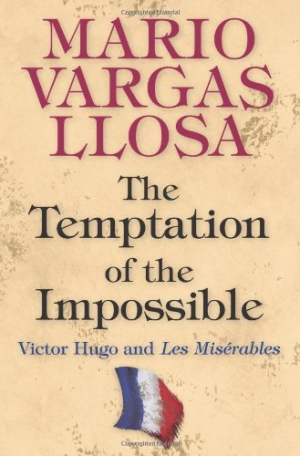The Temptation of the Impossible
Victor Hugo and Les Miserables
Warning: Do not trust fiction that offers “the temptation of the impossible.” That was critic Alphonse de Lamartine’s 1862 reaction to Victor Hugo’s gargantuan novel, Les Misérables. Now readers of Mario Vargas Llosa’s intriguing new book can discover what Lamartine meant and why he was so very wrong.
Part literary criticism, part biography, and part personal essay, The Temptation of the Impossible is the author’s perceptive tribute to Hugo’s Les Misérables. For Vargas Llosa—the extraordinary Peruvian novelist, journalist, and literary critic—Hugo’s marvelous novel is a brilliant portrayal of “a world blazing with extreme misfortune, love, courage, happiness, and vile deeds.” Vargas Llosa is a novelist and essayist, whose Making Waves won the National Book Critics Circle Award.
Hugo’s characters and themes are central to Vargas Llosa’s analysis in which he focuses on the practical and theoretical aspects of the novel, but the perceptive Peruvian critic most persuasively argues that it is Hugo’s narrator’s enormous verbal talent and lyrical strength that ensure the novel’s success. The narrator, says Vargas Llosa, is remarkable for his “omniscience, omnipotence, exuberance, visibility, and egomania. He knows everything that happens during the time of the novel, those eighteen years that begin on an October evening in 1815 […] and end that night in 1833.”
Moreover, Vargas Llosa asserts that a great novel—especially Hugo’s “masterpiece of impossibility” in which readers share in the adventures of Valjean, Cosette, Marius, Javert, and others—is illustrative of why novels exists: so that readers can experience the “vicarious, transient, precarious and fascinating life” of fiction and thereby “incorporate the impossible into the possible,” which then allows them to enjoy their lives as a seductive blend of both reality and unreality. Some literary critics may disagree with his provocative claims regarding the role of fiction in readers’ lives, but Vargas Llosa argues so passionately that even dissenting critics will admire his zealous and meticulous reasoning.
Hugo’s depiction of “beautiful and ideal worlds,” Les Misérables, while extraordinarily popular in the nineteenth century, attracts few contemporary readers for whom it might seem excessively long and discursive. In fact, potential readers are probably more familiar with the spectacular Schönberg-Boublil musical than with Hugo’s book; the box-office phenomenon opened in September 1980 in Paris for an eight-week season and has shown little signs of fading from the limelight. Nevertheless, for any student of world literature who is interested in an important and hugely readable, one-stop critical analysis of Hugo’s canonical novel, Vargas Llosa’s book is the perfect destination. Readers may not be persuaded of the canonical greatness of Les Misérables, but they will certainly be entertained and edified by Vargas Llosa’s infectious enthusiasm.
Reviewed by
Tim Davis
Disclosure: This article is not an endorsement, but a review. The publisher of this book provided free copies of the book to have their book reviewed by a professional reviewer. No fee was paid by the publisher for this review. Foreword Reviews only recommends books that we love. Foreword Magazine, Inc. is disclosing this in accordance with the Federal Trade Commission’s 16 CFR, Part 255.

